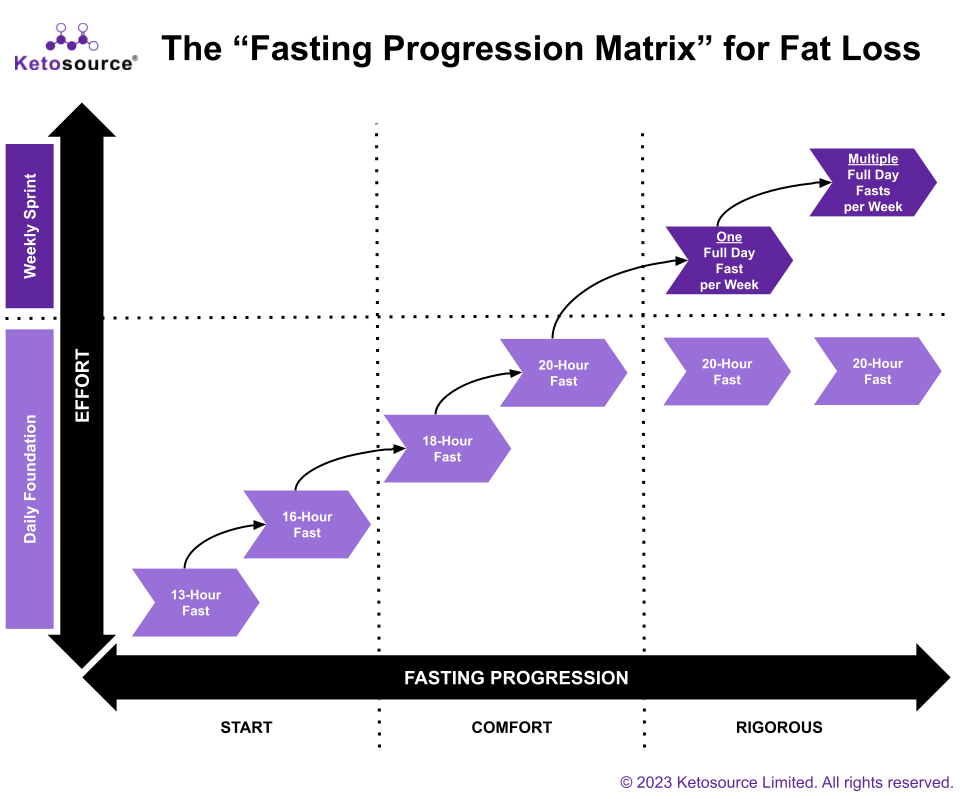ONE Actionable Takeaway from Ketosource
Which fast should I start with for fat loss? What type of fasts should I be working towards?
We created the fasting progression matrix to answer these questions for clients with fat loss goals.

The goal is to progress to your ideal fasting rhythm (aka one you can keep to over time, with the most benefits).
Use these principles with the matrix to guide you to your ideal fasting rhythm:
- First, you find your daily foundation.
- You start with lowest effort (to ensure you stick with it and adapt) at the bottom-left.
- You then move your way to the right when it gets easier.
- Important: You only move right when you can fast every day with the fast type you’re on.
- Most people end up finding that the comfort zone is what works best (i.e. 18-hour or 20-hour fasts)
- Second, you can add weekly sprints
- Once you’ve found your foundation you can add weekly sprints on top of it.
- Most clients plan the sprint fasts on a week by week basis, based on how they think their week ahead is.
Starter Example: Someone with a daily foundation of 13-hour fasts (e.g. 7 pm to 8 am the next day). No weekly sprints.
Rigorous Example: Someone with a daily foundation of 20-hour fasts. They also do two weekly sprints of full-day (24-hour) fasts a couple of times per month.
ONE Quote from a Credible Expert
Why you should use DEXA instead of BMI to understand your body fat and muscle composition. From Dr. Ken Ford, founder of the Institute of Human and Machine Cognition (IHMC):
“These [skinny fat] phenomena that you’ve discussed really help to highlight the… considerable shortcoming, of the BMI method.
…it’s a very simplistic method just relating height to weight. And consequently, you’ll have people with… perfectly normal BMIs who are, in fact, in bad shape. A lot of fat deposits where they don’t need to be.
And you’ll see people that are lean and strong with high BMIs. Weightlifters, athletes often are obese or borderline obese on the BMI test even though they’re very lean. So it seems relatively useless.
I like the use of the DEXA providing a percent body fat and much more information.”
Source: Weight Management, Ketogenic Diet, and the Treatment of Metabolic Diseases | STEM-Talk Podcast #142
ONE of Your #1 Questions Answered
The Question:
The top question sent in from you this week was from Sarah G. Thank you Sarah!
“I’m surprised that I am not losing weight quicker given I stick so closely to keto guidance. Why am I not losing weight more quickly?”
The Answer:
Sorry to hear that you’re not losing weight as quickly as you’d like. It’s normal to feel surprised and frustrated in this situation – we see it a lot.
Here is what we find resolves this situation most of the time.
First, how does your rate of weight loss compare to the typical results seen?
On a keto diet you can expect to lose up to 0.9 kg (2 lbs) per week on average. This might not sound like much, but over time with consistency, it adds up.
Sometimes we see people drop weight rapidly at the start and then slow down to this sustainable pace. This can sometimes feel like a stall, but in fact, you’re progressing at a typical rate.
Second, has your weight loss actually stalled?
We define a weight loss stall as two weeks without any progress. This is because there are other factors that can influence your weight on a day-to-day basis. So it’s best to keep calm within any 2-week period.
Finally, if the weight loss is slow over a 2-week period, here’s the number one thing we troubleshoot with keto.
Weight loss happens when you are able to eat fewer calories each day. Keto helps with this by reducing your appetite – so you eat less without trying.
But liquid calories are easy to over-consume and add up quickly. So it’s always worth checking if you can reduce any liquid calories.
One example of this is adding any extra liquid fats to your diet. This could be butter or coconut oil added to drinks or pouring over meals.
(Note: C8 MCT is a liquid fat, but is a special case that is okay because it lowers your hunger)